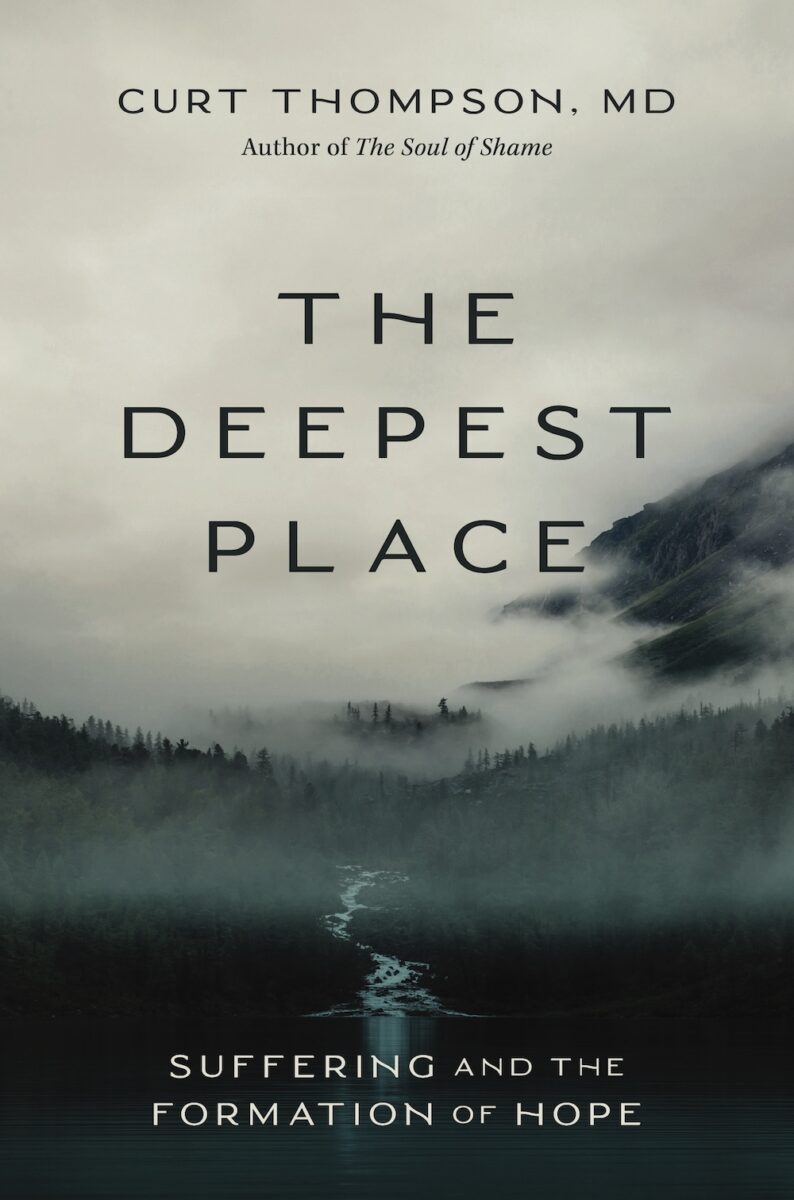The Beauty of Leaning on Each Other: Jordan Davis & Curt Thompson
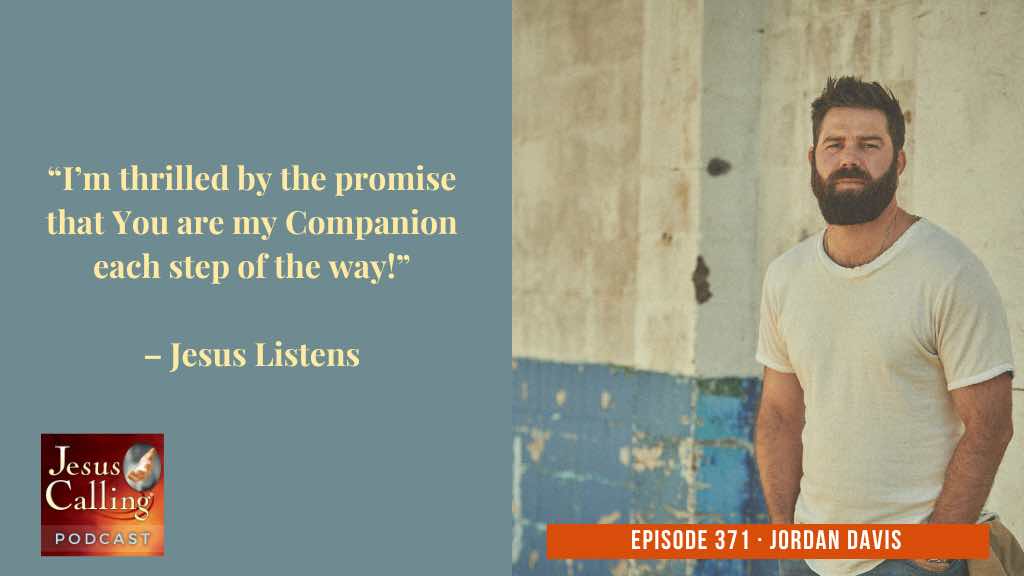
Jordan Davis: You always have to find somebody that you look up to, and no matter what you’re doing, whether it be music, whether it be sports. And I think when it comes to our spiritual journey, it’s the exact same thing. That’s kind of where I feel closest to the Lord, whenever I’m around those spiritual role models.
The Beauty of Leaning on Each Other: Jordan Davis & Curt Thompson – Episode #371
Narrator: Welcome to the Jesus Calling Podcast. Having friends and being part of a community can give us strength, understanding, and inspiration. When we have friends who share beliefs and/or support us, it’s like having a team that’s there to always lift us up, whether it is spiritually, emotionally, or physically. Through friendships, we can actually help deepen and strengthen our faith by reminding ourselves that we are a part of something greater.
This week singer and songwriter Jordan Davis shares his experiences and conversations with friends and family that taught him about his faith, and his music. Psychiatrist Curt Thompson discusses what it’s like when we walk with someone through their pain, and how it makes us grow in spiritual thought and understanding.
Let’s start with Jordan’s story.
Jordan: My name is Jordan Davis. I live in Nashville, Tennessee. I am a father to a four-year-old daughter, a two-year-old son, and a brand new baby boy. And I’m also a singer/songwriter, and I get to truly live my dream every day of my life, so I’m a very blessed guy.
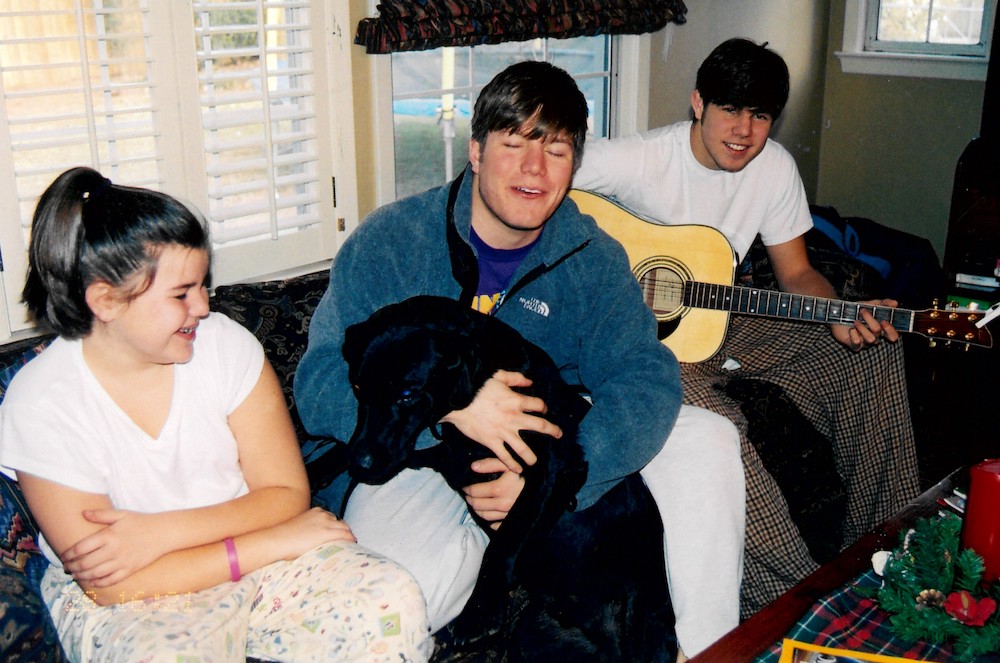
I could never get away from music. My dad played and wrote songs around the house, my mom played piano in the church. My dad was a huge country music fan, so whether we were at his shop or just hanging around the house, music was always going, or [he was] taking us to the CD shops.
Chased by Faith and Music
You know, my mom did such a great job implementing Christ so early in our life. We had a great church that we were part of. And that was so instrumental in my faith journey. So it was just so ingrained in us since I can remember, and there was just no getting away from it.
I say I tried to run away from it for as long as I could, and it finally ran me down about my senior year in college, and I knew that this is what I wanted to do. I made the move to Nashville shortly after that and started trying to write songs.
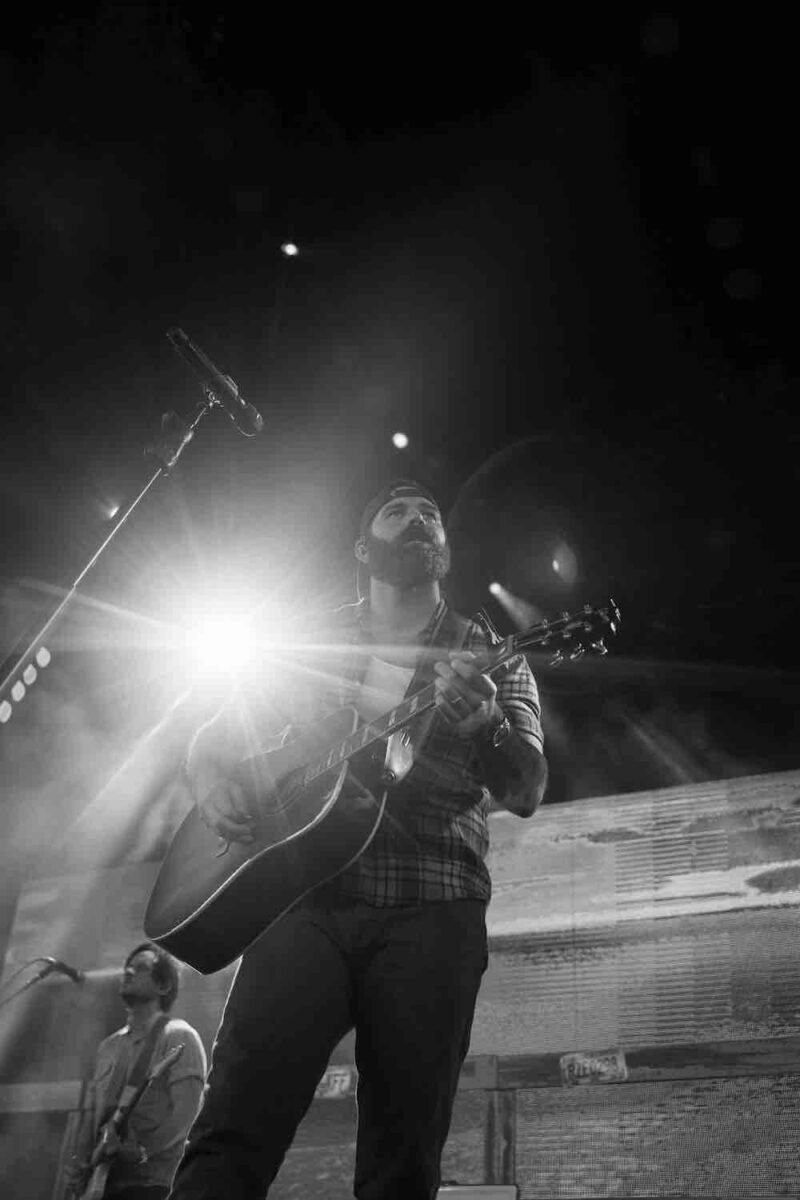
My first couple of years in Nashville, I was bartending from 3:00 PM to midnight, and I was trying to write songs from 9:00 AM to 2:00 AM before I had to leave. So I was going all day for those first four years. And then I finally kind of started to get the ball rolling, and I was able to get a job writing songs and quit my job as a bartender and just focus on that. [That] is when I really feel like I started writing the music that would go on to be my first album.
I think early on moving to Nashville, I got in a small group with a guy named Randy Heron. And I still to this day go back to some of those meetings, and I can hear Randy speak on stuff that I needed to hear at that time. The good Lord led me to that small group.
Fast forward a couple of years to where I’m starting to get in writing rooms and it’s, What do you want to say? How vulnerable, how vocal about your faith do you want to be, or do you just want to do the kind of nuts and bolts country song that can work? And I’ve met guys like Josh and Matt Jenkins that have just helped me be like, “Man, naw dude, we’re called to be vocal about this. We’re called to say that we follow God, that we love God, that we believe in Jesus.” And, you know, being with those guys has been super instrumental in me putting that into my songs and just being more comfortable talking about it on stage.
Church in a Chevy

The day we wrote “Church in the Chevy,” my brother was supposed to be there, but his middle daughter, Lane, was born, so he was at the hospital. And I think we just kind of started talking about being grateful for another healthy baby. All of our writing sessions always kind of end up turning into what I call a small group Bible study. We always kind of start off with what we’re going through and if there’s anything we can pray for each other about, and it kind of turns into a mini church.
And I think also, through meeting so many people, I’ve realized that there’s some really rough church stories out there. People that got into the church early and maybe something happened and it kind of turned them away from it. Church is right now, us talking about it. Church is waking up and having a quiet time. It’s all around. So you could be in a Chevy on a back road. You could be in a deer stand. You can be going through some tough things at home. You just grab your Bible and talk about it.
“Church is right now, us talking about it. Church is waking up and having a quiet time. It’s all around. So you could be in a Chevy on a back road. You could be in a deer stand. You can be going through some tough things at home. You just grab your Bible and talk about it.” – Jordan Davis
Church is wherever you want it to be. I like to say the good Lord’s always listening, it’s on us to talk to Him. So that’s truly why I think that song’s connected with so many people, because it’s taken church away from a Sunday morning building and made church a conversation with God whenever you need it.
Loving What You Do and Why You Do It
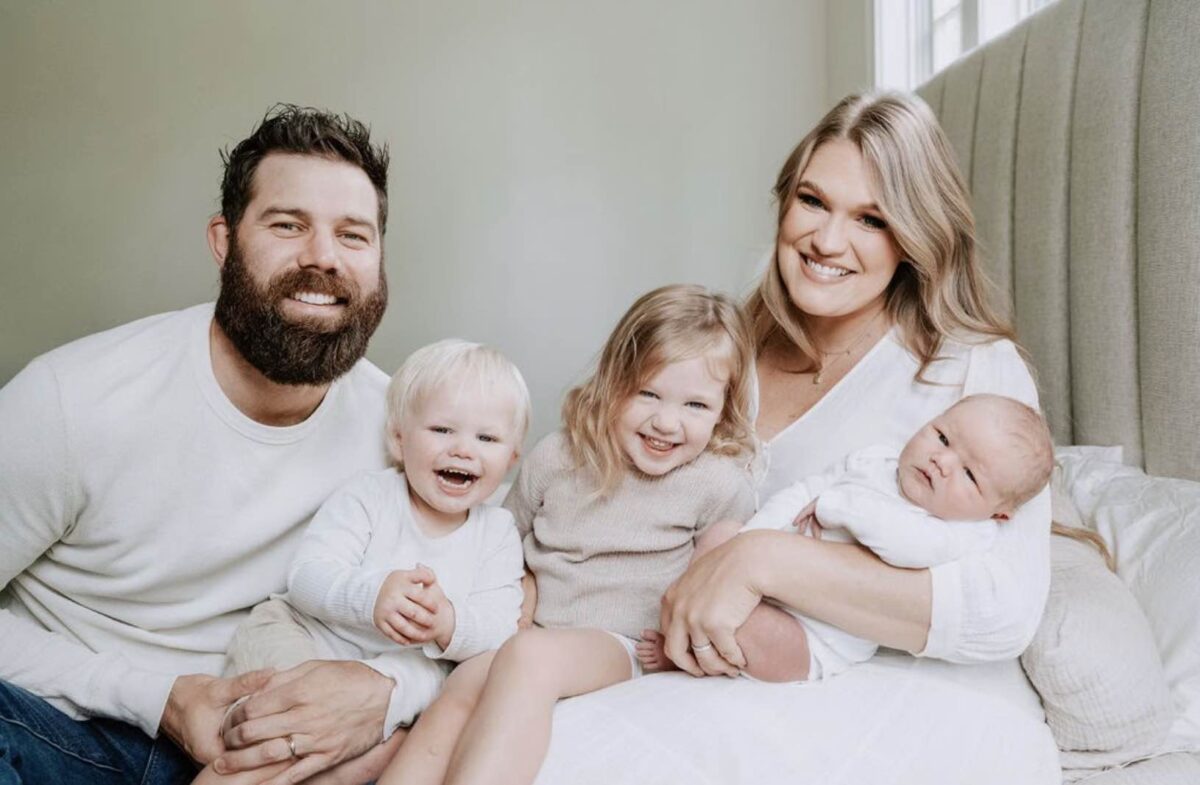
After thirty-five years of me doing this, I’ve realized that my low points and the valleys, if you will, of my life, come from when I get away from Christ, when I start living for me, or I get away from quiet time, I get away from prayer time, and I start thinking about the things that I think are going to make me happy.
He is number one priority, and then right behind that, it’s my family. I’ve had such an amazing year, two huge songs, but if I didn’t have my wife or my brother or my kids to celebrate that with, it’s like, Why would I not just go get a job? That’s why that stuff is special, you know? Winning Song of the Year with “Buy Dirt” was special, because I got to stand up there with my family. I got to stand there and my brother, my wife was there, my mom was there. That’s why that night was what it was. I surround myself with people that keep those two things number one and number two priority, you know?
God could care less how many number ones I get there with, that’s not what this is about. That’s not what I got into music for—for accolades and number ones. I got into it because I loved it, and now I think I’m learning that if I leave it just to me, I will wreck this thing. I will do this for all the wrong reasons. And waking up, putting God first and realizing how blessed I am to get to do this—I have these conversations with God where not only do I feel like I know what He would say, but I also kind of feel like I can see His facial expressions, and I just have Him with this kind of like smirk on His face being like, Why do you think I allowed you to play music? Like, Why do you think I’ve given you this platform? Do you think it’s for you? And I know the answer to that.
Praying for a Chance to Make a Difference
There’s nothing like a good prayer in the sense of coming to Him and saying, “Hey, Lord, man, I’m struggling right now. I need to feel your presence. I need something to kind of calm my mind to let my family know I’m thinking about them, they’re here with me.” And He always shows up. I’ve never said “Amen” and wrapped it up and not felt like He was there to answer the call.
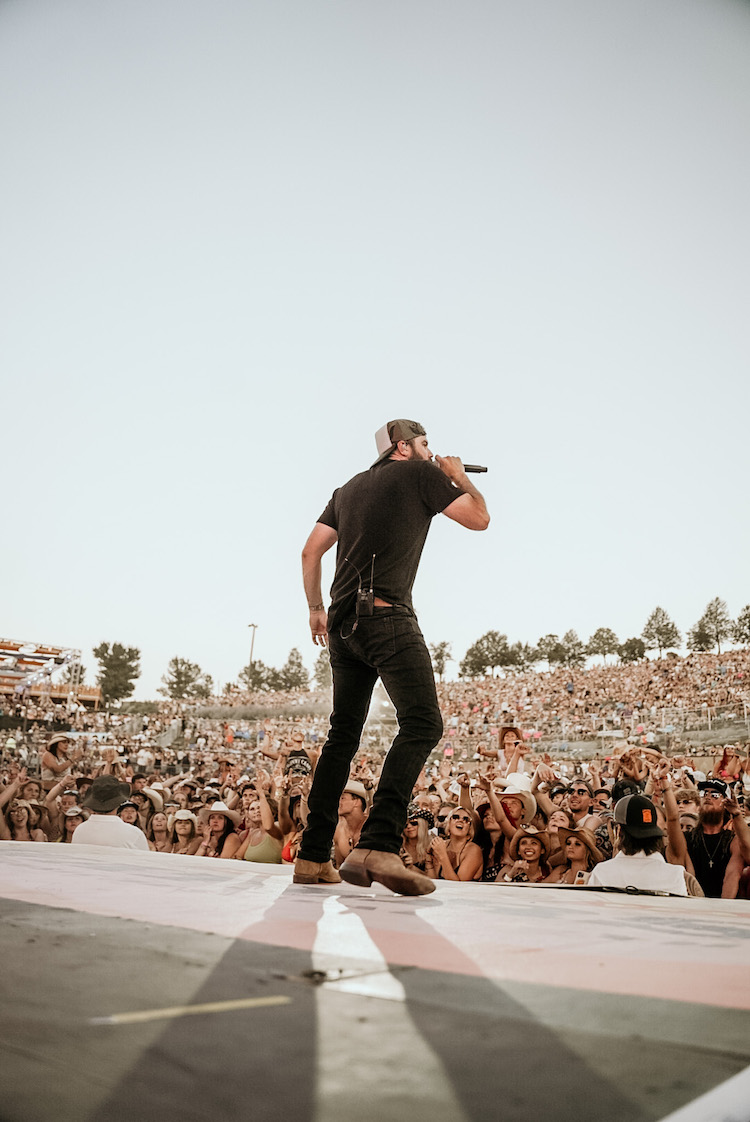
We’re called to pray for everybody. Seeing the loneliness and some of the mental health issues in the world, like, the only way that I know to combat that is to pray about it and to just say, “Lord, I know you have this, but still help me show how I can help in any area.” Some of that prayer has gone from being very, very broad and like to where I’m just very selective, like, “Lord, put somebody in my life today that could use a light, somebody that’s lonely that I could help out, somebody that needs some guidance. Put them in the crowd tonight. Let one of my messages get through to them.” I’ve just prayed that I get a chance to actually make a difference. And I’ve prayed that and the Lord puts that in my life.
“We’re called to pray for everybody. Seeing the loneliness and some of the mental health issues in the world, like, the only way that I know to combat that is to pray about it and to just say, ‘Lord, I know you have this, but still help me show how I can help in any area….Lord, put somebody in my life today that could use a light, somebody that’s lonely that I could help out, somebody that needs some guidance. Put them in the crowd tonight. Let one of my messages get through to them.’ I’ve just prayed that I get a chance to actually make a difference.” – Jordan Davis
This is from Jesus Listens, April 30th:
My great God,
You are my Strength and my Shield! I’m grateful that You’re continually at work in my life—sometimes in wondrous ways—to strengthen and protect me. I’m finding that the more fully I trust You, the more my heart leaps for Joy!
Help me to trust You wholeheartedly, resting in Your sovereign control over the universe. When circumstances seem to be spinning out of control, I need to grab on to You—clinging to the truth that You know what You are doing. While I’m in the throes of adversity, my greatest challenge is to keep trusting that You are both sovereign and good. But I realize I can’t expect to understand Your ways, for as the heavens are higher than the earth, so are Your ways higher than mine.
I want to please You by responding to trouble with thanksgiving, trusting that You can bring good out of the most difficult situations. When I respond in this way, You are glorified and I am strengthened. O Lord, I give thanks to You in song.
In Your joyful Name, Jesus,
Amen
Narrator: To keep up with Jordan Davis, follow him on social media, and be sure to check out his music on your favorite platform.
Stay tuned to Curt Thompson’s story after a brief message.
Spreading Hope With Samaritan’s Purse
At Samaritan’s Purse, we bring spiritual and physical aid to hurting people around the world. We go into dangerous situations because in disaster and disease, in war, Jesus calls us to love our neighbor, to heal the sick, and feed the hungry, restore the broken. All who work and volunteer with Samaritan’s Purse follow the example of Jesus. We go to serve, not to be served. And we go in Jesus’ name. Join us at www.samaritanspurse.org.
Our next guest is author and psychiatrist Curt Thompson. Curt delves into the complexities of suffering, and shows us how community can help us to both find hope and ignite our faith.
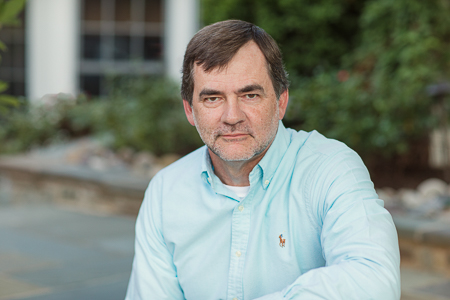
Curt Thompson: My name is Curt Thompson. By trade, I’m a psychiatrist and I see patients, both individuals, and historically I’ve seen couples and adolescents. I practice here in Northern Virginia, and that’s been my work for the last thirty years.
In this particular field of interpersonal neurobiology in which I work, this opportunity to bring together the mechanics of how the world works in the world of the mind, and what that means in light of the anthropology of the biblical narrative, what it means in light of being someone who is a follower of Jesus and who believes that the story that we read about in the arc of the scriptural texts is the story that describes who we are as humans, God’s vision for who we were to be as humans, how we’ve kind of gone off the rails and continue to go off the rails, and the fact that we need a rescue. And you look around our world, it’s like, “Yeah, we need a rescue.” I don’t know who wouldn’t think that we need a rescue. And we read these pages and believe that our rescue has come in the person of Jesus.
Where Does Suffering Lead?
This thing that we call faith, that’s really about trust. And trust is really about attachment processes. For me to trust someone has everything to do with the nature of how I believe that person can see me and sense me. And it’s not just that they’re trustworthy is some abstract idea, there has to be some kind of embodied experience that persuades me that this is true. When we follow that entire text verses one through five, especially when we get to verse three—which many of our listeners might be familiar with—that, “In glory we also, therefore, we celebrate in our suffering because suffering leads to perseverance, which leads to character, which leads to hope, which does not put us to shame because the love of God that is poured out into our hearts through the Holy Spirit.” That whole progression has significant grounding in what we are learning about how the mind works. And when we are able to imagine those features of how the mind works, that really enables us to put into concrete practice the very things that Paul is writing about. And it no longer just remains an abstract text that somehow I have to imagine persevering in the middle of suffering.
The reality is that if we have a pulse, if we are human, we suffer. It’s kind of like having a pebble in your shoe. I think if it were there for most of the day, we would start to get a little irritable. I wouldn’t like a pebble in my shoe, but if I walk around on the earth, just trying to pretend that the pebble isn’t in my shoe—and I suppose I could try to do that. What I’m really doing is walking around pretending that the world is not the way it really is.
“The reality is that if we have a pulse, if we are human, we suffer.” – Dr. Curt Thompson, M.D.
We might say, “Well, I’m not aware of where I suffer,” then it probably means there’s a fair bit of me that is just simply not aware. If we are human, it means we have wounds. It means we have experiences within our families. It means the things that have happened to us or things that we’ve done to ourselves or to others that create suffering. And so my first response when I reflect upon why it’s important for us to name suffering is because it’s about naming and accepting the reality of the world.
Faith in its most real form is really an act of trust that I place in a real person. So when I say I have faith in a person, whether it’s Jesus or somebody else, it is because I am offering things about my life to them that I am entrusting to them in real ways. And it’s easy for us to talk about our having faith in God, we just don’t trust human beings. And I would say the degree to which we actually trust God is measured in terms of the degree to which we trust others who are actually trustworthy.
“Faith in its most real form is really an act of trust that I place in a real person. So when I say I have faith in a person, whether it’s Jesus or somebody else, it is because I am offering things about my life to them that I am entrusting to them in real ways. And it’s easy for us to talk about our having faith in God, we just don’t trust human beings. And I would say the degree to which we actually trust God is measured in terms of the degree to which we trust others.” – Dr. Curt Thompson, M.D.
When it comes to our suffering, faith is the only role that is going to be most important in accepting that, because it is in that space in which I’m actually practicing trusting others with my pain as a way of me coming to learn that my pain does not have to have, will not have, the final word in my life. And therefore even the suffering that I experience as the Scriptures attest to, becomes part of what God uses to transform me into a more real version of who He envisions me to be, that He wants me to be, that He’s getting me ready to be for the heaven that’s coming.
You’re Not Alone in Your Suffering
Suffering is an experience of pain. It begins with pain, some kind of painful stimulus, whether that’s an explicitly physical stimulus—I have low back pain, I have cancer—or if that’s an emotional stimulus. The felt sense that someone’s hurt my feelings, or the felt sense that because I’m a Christian, certain people have disowned me or walked away from a friendship. There’s a certain pain that we experience, but that pain turns into suffering when that pain is something that we still experience over time. And we experience it as suffering in many respects because we can’t get rid of the pain right away, but also because most significantly, we experience it by ourselves.
When we think about ways to engage authentically with our own suffering, one of the things that’s important for us to know is that the most authentic way that we do it is not by myself, it is in the context and the process of relationships. So one of the most practical ways to authentically engage with my suffering is to talk about it with someone else who will be with me in that regard. And my capacity to talk about it with someone else not only is something that will affect me, it will affect the listener of my story. And in this way, when someone is able to be with me in my suffering, I learn that I am not alone in it.
Suffering is what draws us together in so many ways that shapes, deepens, authenticates the relationship that we have, and so opens our minds and hearts and awareness to what it means for us to share in the sufferings that Jesus experienced.
“Suffering is what draws us together in so many ways that shapes, deepens, authenticates the relationship that we have, and so opens our minds and hearts and awareness to what it means for us to share in the sufferings that Jesus experienced.” – Dr. Curt Thompson, M.D.
We have lots of legitimate questions for God and for each other about things in our lives for which we truly do suffer. The reality is that if I ask you the question, “Why did my son not come home from Iraq?” There’s not going to be any answer that’s going to help me feel any better about that. I’m still going to grieve. Knowing the explanation for things doesn’t bring back my son from Iraq. I’m still left with this deep sadness.
And no amount of explanation serves to mitigate the suffering that takes place in the wake of our violence, but this presence of God, inviting us into a space where He says, “I am where you are. In fact, I’m even more deeply embedded in your suffering than you are,” gives us the opportunity to allow ourselves to practice being loved in the hardest of places of our lives.
Curating Beauty in the Midst of Our Suffering
We talk about suffering being this experience of pain over the course of a period of time that we often can’t control, but the presence of others in my life, in the context of my suffering pain necessarily transforms my experience of suffering in addition to the pain because of their presence. Moreover, because that changes my experience of pain, it changes my capacity to generate and hold onto hope in the future. When we talk about hope, we recognize that hope is something that we experience as a function of a future state. I’m hoping for something that’s going to happen in five minutes or in two weeks or in five years. I’m hoping for certain things. But our futures that we anticipate are only ever things that we construct out of our remembered past. And so the degree to which I’m able to be hopeful has everything to do with my having had experiences that give me good reason to be hopeful about the future. I think it’d be fair to say that we take a look around at our world right now, and it’s not easy to be hopeful because a lot of what we actually see happening in real time and space feels very disorienting, can feel very distressing.
And if I am not having a real time and space, real embodied experience on a regular basis, that gives me a felt sense of well-being, and it’s going to be hard for me to generate hope. But when I do that, when I have those encounters in confessional community, when I have the encounter within the body of Jesus, those encounters become things I can pay attention to and remember.
We’re not just people who Jesus has to take care of, but we are sharing in His sufferings. And so we become part of His overall mission to transform and renew the world, which has been our God-given mission from the beginning. Our God’s vision was for us to be those who, as His image bearers, steward and create and curate beauty and goodness in the world. And this becomes yet one more way that we can do it, shockingly, by doing it right in the context of our suffering.
“Our God’s vision was for us to be those who, as His image bearers, steward and create and curate beauty and goodness in the world.” – Dr. Curt Thompson, M.D.
Forming Hope for Tomorrow and Beyond
When I imagine suffering or when I imagine hope, I imagine it as something that I, Curt, am going to personally experience and I have to come up with the answer to the question, What am I going to do about that? And also, when it comes to hope, what are the things that I’m going to do that are going to help me be hopeful? What am I going to do? And I can easily forget.
We have to be reminded because as humans, we forget. I am a forgetful man. I forget things. We only become the things that we pay close attention to and that we pay close attention to repeatedly. I became a good pianist because I am practicing this piece of music over and over and over and over and over again.
One of the most frequently offered utterances, admonitions, commands in the Scriptures that begins in the Hebrew Bible and then extends into the New Testament is the notion of people remembering things.
The practicing of this repeated immersion in the texts and in language and metaphor and the screenplay that remind us that Jesus is with us, actually, are taking advantage of the way the brain and the mind are designed to work at their best. This is why those kinds of repeated practices, even for short periods of time, can be so very helpful in the transformation of our lives.
The entire Scriptures of the Bible that we have as Christians is meditative wisdom literature, we have to stay with it over and over. Reading things like Jesus Calling, it’s like paying attention repeatedly to anything that we long to become. This repetitive practicing makes it possible for us to remember what it means to acknowledge and welcome our suffering. And this is why the devotional book of Jesus Calling is such a helpful resource, because every single day we are given words on a page, but those words evoke imagery, and those words evoke emotional states. Those words evoke within our minds a screenplay that we are imagining in that moment, and we far more powerfully remember things that we sense and image and feel than things that we think in terms of abstract words.
I hear the Father saying, “Pay attention to what I’m doing right where you are, and allow yourself to generate and form hope in what you are actually witnessing. And know that I’m doing that not just in you and in this small body of people with whom you have a relationship, but I am doing this very thing all over the world. And no matter how dark the world wants to paint itself as being, nor no matter how often the world wants to describe its own new solution for the problems it’s creating, just know that I am with you and I am working in you and through you in the space that you actually occupy. And that my love for you is always going before you, coming behind you. And that’s what I really want you to pay attention to so that you can form hope.
Narrator: To learn more about Curt Thompson, check out his new book, The Deepest Place, at your favorite retailer.
If you’d like to hear more stories about friendships, check out our interview with Victoria Osteen.
Next week: Max Lucado
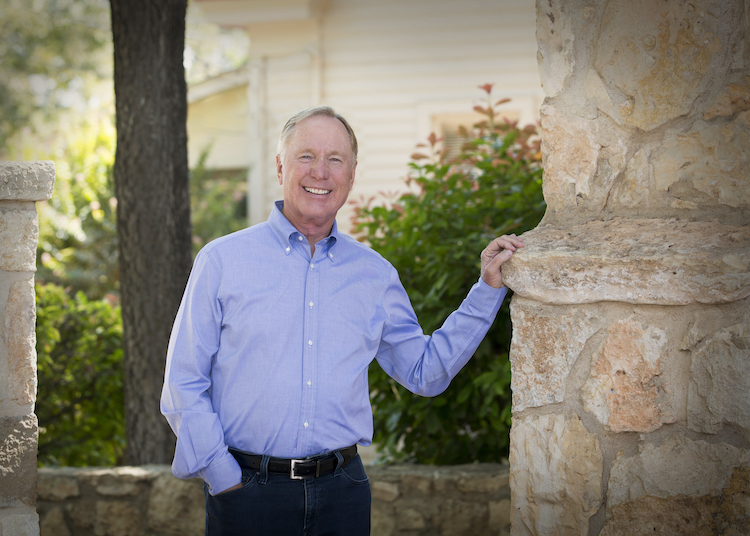
Next time on the Jesus Calling Podcast, we’ll hear from famed Christian author Max Lucado talk about how God never gave up on him, even in his darkest seasons.
Max Lucado: I learned a lesson that God never did give up on me. He could have. I was misbehaving, I was hiding, I was doing the very thing I promised I wouldn’t do, and I was telling people not to do. So that’s just one of the times in which God has been gracious enough to pull me back on track.

